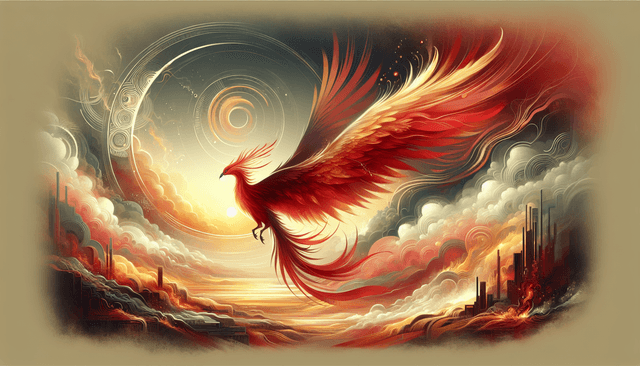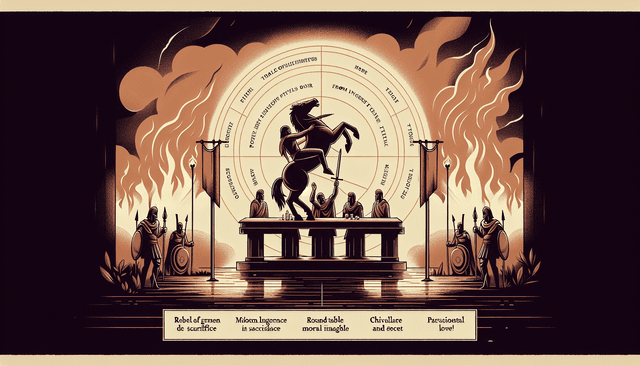Table of Contents
Creating a myth might seem like a daunting task, especially when you think about the grand stories passed down through generations. It’s easy to feel overwhelmed, but don’t worry; you’re not alone in this. Many wonder how a simple idea can transform into a captivating tale that resonates with others.
Stick around, and I promise you’ll discover the secrets to crafting your very own myth. By the end of this journey, you’ll unlock the elements that make myths stick, learn about different types, and avoid common pitfalls—all while having a bit of fun!
From understanding the core elements to exploring the role of culture, we’ll break it down step by step. So, let’s dive into the enchanting world of myth-making together!
Key Takeaways
- Start with a clear core message or moral to guide your myth.
- Include relatable characters who face significant conflicts for growth.
- Enhance your myth with vivid settings and extraordinary events.
- Utilize various types of myths (creation, hero, trickster) based on your message.
- Avoid common mistakes like overcomplicating the plot or neglecting character depth.
- Incorporate symbolism and themes to add layers of meaning to your story.
- Engage with cultural context to ensure authenticity and relevance.

How to Create a Myth
Creating a myth involves weaving a story that resonates deeply with cultural themes, human experiences, and universal truths.
Start by identifying the core message or moral you want to convey.
This can guide the entire narrative, giving it a purpose that will resonate with your audience.
Next, consider the characters and settings; legends often include memorable beings like gods, heroes, or mystical creatures.
Think about how these characters can embody the virtues or vices associated with your myth’s theme.
For example, the classic myth of Icarus illustrates the dangers of hubris through his tragic fall.
Another tip is to incorporate extraordinary events or natural phenomena that cause wonder.
These detail help amplify the mythical nature of the narrative, making it more captivating.
The Elements of a Good Myth
A solid myth typically contains several key elements: a relatable protagonist, a significant conflict, and a resolution that often delivers a moral lesson.
Your protagonist should be someone the audience can empathize with, someone whose emotions and journey resonate universally.
The conflict can be internal or external, but it should challenge the protagonist significantly, allowing for character development.
Many myths also feature supernatural elements that serve to heighten the stakes. Think of the Greek myths where gods intervene in human affairs.
In addition, establishing a rich setting can enhance the story, pulling readers into a world filled with wonder.
On top of that, consider employing recurring symbols or motifs as they can reinforce the themes of your myth.
For example, the labyrinth often symbolizes a complex journey or the search for knowledge.
Types of Myths and Their Purposes
Myths can generally be categorized into several types: creation myths, hero myths, and trickster myths, among others.
Creation myths explain how the world and its inhabitants came to be; they often address profound existential questions.
Hero myths, on the other hand, usually revolve around individuals undertaking great quests, offering insights into human resilience and bravery.
Trickster myths often play with the idea of cleverness and deception, reflecting the complexities of morality.
Each type serves a purpose, whether to teach crucial life lessons, explain natural phenomena, or promote cultural values.
Recognizing the type of myth you want to create can help shape its direction and audience impact.
For a deeper understanding of these types, look into more resources on mythical storytelling.
Steps to Crafting Your Own Myth
To craft your own myth, start with brainstorming ideas centered on universal themes such as love, death, or transformation.
Once you have your idea, outline the key components: character, setting, conflict, and resolution.
Next, develop a compelling protagonist, ensuring they have clear motivations and flaws that drive their journey.
Then, create a setting that enhances the story’s mood. Whether it’s a mystical forest or an ancient city, the right backdrop can elevate your narrative.
As you write, focus on using vivid language and imagery; myths thrive on being both poetic and evocative.
Don’t forget to incorporate dialogue that feels authentic to your characters and helps propel the story forward.
Finally, revise your draft, paying special attention to consistency and clarity, ensuring your myth resonates with readers.
For those struggling with inspiration, consider exploring writing prompts or storytelling techniques.

Common Mistakes in Myth Creation
Creating a myth can be a fun exercise, but there are pitfalls to avoid to make your storytelling effective.
One common mistake is overcomplicating the plot; myths should be clear and engaging, not tangled in confusing details.
Another issue is neglecting character development. Ensure your characters have depth and growth, or they may fall flat.
Many creators forget the importance of cultural context. Myths should feel relevant to the culture from which they emerge.
Recycling tired tropes without adding a fresh twist can also be tempting but unoriginality can harm your myth’s impact.
Make sure to avoid modern jargon unless it serves a specific purpose in the narrative.
Lastly, not revising your story can lead to inconsistencies and plot holes. Always review and refine your draft.
Remember, myths are meant to inspire and teach, so clarity in your message is key.
Enhancing Myths with Symbolism and Themes
Incorporating symbolism and themes into your myth can elevate it from a simple story to a powerful narrative.
Symbols serve as visual cues that can add layers of meaning. For example, the phoenix symbolizes rebirth, a theme seen across various cultures.
Similarly, colors can represent emotions or concepts, like red signifying passion or danger.
Using themes helps to connect the story with broader human experiences—think love, sacrifice, or the struggle between good and evil.
One effective technique is to integrate a central theme that aligns with your character’s journey and the challenges they face.
For instance, in the myth of Persephone, themes of growth and cyclical change are intertwined with her seasonal journey.
To weave these elements into your story, consider how they can be subtly introduced through dialogue, settings, and character choices.
Analyzing existing myths for their symbolic elements can also provide inspiration for your creations.
The Role of Culture in Myth Making
Cultural context plays a crucial role in the creation and acceptance of myths.
Myths often reflect the values, morals, and beliefs of the society from which they originate. Understanding this can help you craft stories that feel genuine.
For example, many Native American myths focus on respect for nature, demonstrating the importance of harmony with the Earth.
When creating your own myth, consider what elements of your culture you want to include; these could be traditions, historical events, or even language.
It’s also important to engage with cultural sensitivity, avoiding stereotypes and emphasizing authenticity.
By intertwining your myth with cultural elements, you can create narratives that resonate on a deeper level, fostering a sense of connection with your audience.
Researching various cultures can provide a treasure trove of ideas, enhancing the richness of your myth.
Furthermore, recognizing how myths shape cultural identity can be an impactful lens through which to view your storytelling efforts.

Examples of Famous Myths and Their Impact
Famous myths have shaped cultures and societies for centuries, influencing literature, art, and moral values.
Take the myth of Prometheus, who stole fire from the gods to give to humanity; this story highlights themes of rebellion and sacrifice.
Its impact resonates even today, representing the ongoing struggle for knowledge and the consequences that can follow.
Another notable example is the tale of King Arthur and the Knights of the Round Table, which emphasizes chivalry and honor.
This myth has been adapted into countless works, showcasing its enduring relevance in discussions around leadership and morality.
The myth of the Trojan War is yet another example, inspiring countless adaptations in theatre and literature while exploring themes of love, betrayal, and fate.
Each of these myths not only entertains but also serves as a reflection of human nature and societal values, teaching us lessons that remain pertinent to modern life.
By understanding these impacts, you can draw inspiration and mold your own myth to convey meaningful ideas.
Sharing and Communicating Your Myth
Once you’ve crafted your myth, it’s important to share it in a way that reaches your audience effectively.
Consider the medium that best suits your story—whether it’s written, visual, or oral. Each of these can capture attention differently.
For written myths, utilizing blogs or self-publishing platforms can help you gain visibility.
If you’re into visual storytelling, think about creating an illustrated version or even a short film to convey your narrative.
Oral storytelling remains a powerful way to connect; consider community events or workshops to share your myth live.
Social media can also be a great tool for dissemination. Posting snippets or engaging visuals can pique interest and encourage sharing.
Don’t forget to engage with your audience, invite feedback, and be open to discussions about the themes and characters in your myth.
This can lead to a richer understanding and deeper appreciation of your work while building a community around your storytelling.
FAQs
A good myth typically includes a compelling protagonist, a conflict that tests the protagonist, moral lessons, and rich symbolism. These elements help convey deeper truths about human experience and cultural values.
Common mistakes in myth creation include lack of originality, inconsistent characterization, and overlooking cultural context. Additionally, avoiding cliché plots and ensuring relatable themes can greatly enhance the myth’s effectiveness.
To enhance your myth with symbolism, incorporate meaningful objects, colors, and characters that represent larger ideas or themes. This adds depth and invites readers to find personal interpretations, enriching their engagement with the narrative.
Culture plays a crucial role in myth creation as it influences themes, values, and storytelling techniques. Myths often reflect the beliefs and traditions of a culture, helping to connect communities and pass down knowledge across generations.



